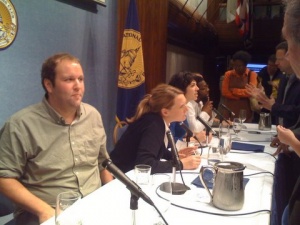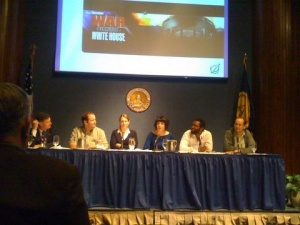September 21st, 2010 by GarySchwitzer in Better Health Network, News, Opinion, Research
No Comments »

I have a lot of catching up to do after being in Europe for just 4 days. But I can’t let this one go by without comment. In fact, this issue was one of the first ones raised by German journalists I met with in Dortmund this week. Don’t think people around the world don’t notice the good AND the bad in American health/medical/science journalism — especially by The New York Times.
The Times took a long time (five weeks) to comment on what critics — including me, Paul Raeburn, Charlie Petit and many other journalists (including Times’ ombudsman Arthur Brisbane) — wrote about Gina Kolata’s August 10 piece on a “100% accurate” Alzheimer’s test. But [on September 16th] the paper published a correction. Read more »
*This blog post was originally published at Gary Schwitzer's HealthNewsReview Blog*
August 19th, 2010 by Berci in Better Health Network, News, Research
No Comments »

 Mary Carmichael of Newsweek had a great series of articles focusing on direct-to-consumer genetic testing. An excerpt:
Mary Carmichael of Newsweek had a great series of articles focusing on direct-to-consumer genetic testing. An excerpt:
I’ve been following DTC genetics since 2007, when wide scanning first became available to the public. Since then, a number of writers have gotten wide-scale genetic tests and expounded on the results. Indeed, I sometimes wonder if I’m the last science reporter on earth with virgin genes. (Technical virgin: My doctor gave me a cystic fibrosis carrier test when I was pregnant.) Initially, I put off getting a full-genome scan because I wasn’t sure how useful such a test would be. I had no particular reason to take one, save curiosity. I wouldn’t expect to find anything serious and potentially life-altering like the Huntington’s disease gene in my results, because my family medical history is thankfully rather boring. The data most likely to be medically relevant to me would concern the genetics of common diseases, and at the time, many comprehensive and well-designed studies of those were still getting underway. I decided to wait a few years and see how research progressed. But here I am, three years later, still unsure.
*This blog post was originally published at ScienceRoll*
August 8th, 2010 by GarySchwitzer in Better Health Network, Medblogger Shout Outs, News, Opinion, Research
No Comments »

Ivan Oransky, M.D., executive editor of Reuters Health, somehow found time a few months ago to launch his first blog, Embargo Watch — with the tagline: “Keeping an eye on how scientific information embargoes affect news coverage.”
Now, as evidence he either doesn’t sleep or has roots in Transylvania, Oransky the Impaler launches a new blog, Retraction Watch along with partner Adam Marcus. Read more »
*This blog post was originally published at Gary Schwitzer's HealthNewsReview Blog*
October 18th, 2008 by Dr. Val Jones in Announcements, Humor
1 Comment »
I have been a fan of The Onion for many years. Its authors have mastered the art of news satire, and although they’re often irreverent, they’re equal opportunity lampooners. I always wondered what The Onion’s writers were like in person, and yesterday my wish to know them better came true at the National Press Club.
The writers are “20-30 somethings” with a wicked sense of humor and a healthy dose of self-confidence. They describe themselves as “schlubs” who have many “schlubby” friends. Most got their start working as reporters for small, midwestern newspapers. They dress casually and claim to be paid very little.
Of course, I bounced up to the panel as soon as the event was over and congratulated them on their science reporting and asked them to reveal to me who wrote the spoof article on medical peer review. It’s one of my favorite Onion articles of all-time, as it follows the science paper of a 5th grader (he wrote it about otters) as it undergoes peer scrutiny, shredding and denial for publication. You can read the article here.
Sadly, the panel members denied any memory of the otter article. I countered with my appreciation for their video news “Most Children Strongly Opposed To Children’s Healthcare” and they nodded politely. One writer asked me if I thought their scientific spoof articles were on-target, or if they betrayed their major lack of understanding of science in the first place.
“Well, as you writers well know,” I said, “‘science is hard.’ But you seem to be getting the right messages across. The medical community needs more reports like ‘Fifth Grade Science Paper Doesn’t Stand Up To Peer Review.’ There’s not much to laugh about in healthcare these days.”
I snapped a few photos of the mysterious authors for my fellow Onion fans. Do you have a favorite Onion article or headline?
P.S. When asked why the paper was called The Onion, one of the panelists said that the first team of writers were so poor they ate onion sandwiches to survive (eww), so they named the paper after their food of choice. The company currently employs about 30 people (20 for video production and 10 newspaper writers). Fortunately those present at the event did not seem to have onion breath.

Onion Breath Test















